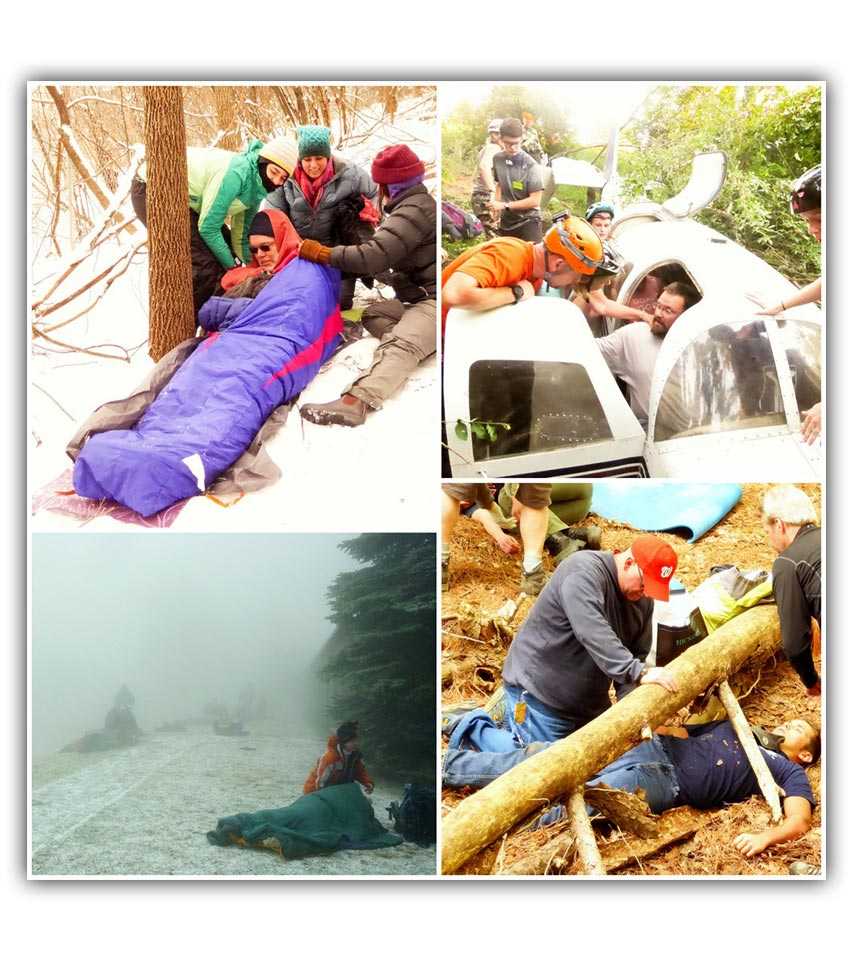Wilderness First Responder

Who is this Course Designed For?
Longer than the wilderness first aid (WFA) course, WFR is especially designed for:- Anyone caught in an urban disaster crisis
- Camp counselors
- Back country trip leaders
- Mountain guides (backpacking, hiking, ice climbing, rock climbing, etc.)
- River guides (canoeing, kayaking, rafting)
- Ski patrollers
- Anyone wanting to delve deeply into how to give emergency care when 911 EMS service is down, overwhelmed, or out of cellphone range.
Overview
The WFR topics list is a comprehensive and in-depth look at the standards and skills of dealing with: Response and Assessment, Musculoskeletal Injuries, Environmental Emergencies and Survival Skills, Soft Tissue Injuries, and Medical Emergencies. Although these appear to be the same basic topics covered in the two-day WFA course, they are covered far more extensively including topics not covered in the WFA course, Instructor Matthew Rosefsky starts out each topic with a shared-learning discussion on prevention, and there is much more hands-on practice. Learning by doing is powerful. You will do, and hence learn, much more. CPR certification is offered as an optional evening-time add-on during the class for those who don't have it or want a refresher. CPR certification is required for the WFR certification to be valid.
- No prior first aid or CPR training necessary. No prerequisites.
- Hands-on learn how to care for an injured / ill person during the critical minutes or hours before ambulance / hospital hand-off
- Blend of classroom instruction & hands-on rescue scenario practice
- 3-year internationally-renowned SOLO WFR certification
- Testimonials
Course Topics
- Abdominal Pain
- Abdominal Trauma
- Allergic Reactions
- Altitude-Related Injuries
- Anatomy of a Backcountry Crisis
- Bites & Stings: Animals & Plants
- Bivouac Skills
- Bloodborne Pathogens & Infectious Disease
- Body Systems: Anatomy & Physiology
- Burns
- Changes in Level of Consciousness
- Chest Pain
- Chest Trauma
- Cold-Related Injuries
- Common Expedition Problems
- CPR Considerations in the Remote Environment
- Diabetic Emergencies
- Dislocations & Reduction Techniques
- Drowning-Related Injuries
- Emergency Lifting & Moving Techniques
- Environmental Emergencies
- Epinephrine Use
- Fractures & Splinting Techniques
- Group Preventative Medicine
- Head Trauma
- Heat-Related Injuries
- History Taking
- Improvising Litters
- Leadership of Backcountry Expeditions
- Lightning-Related Injuries
- Long-Term Management of the Shock Victim
- Long-Term Patient Care
- Long-Term Wound Care
- Medical Emergencies and Patient Assessment
- Medicolegal Issues
- Mock Rescue
- Organizing the Rescue
- PAS in the Extreme Environment
- Patient Assessment System (PAS)
- Poisoning
- Primary Survey: "The First Five Minutes"
- Prudent Heart Living
- Role of the Wilderness First Responder
- Secondary Survey & Vital Signs
- Shock & Bleeding Control
- Shortness of Breath
- SOAPnote & Getting Help
- Soft Tissue Injuries & Bandaging Skills
- Spinal Cord Injury
- Spinal Cord Injury Management
- Splinting Practice
- Sprains & Strains
- Wilderness First Responder Practical Exam
- Wilderness First Responder Written Exam
- Wilderness Stabilization & Bivouac
- Wilderness versus Urban First Responder
Certification & Recertification
- With this course, get the internationally-renowned 3-year WFR certification from SOLO, the oldest continuously-operating school of wilderness medicine in the world.
- Are you a healthcare provider needing continuing education credits? The WFR typically counts for credits, although it may depend on what type of provider you are. Inquire for details (scroll to bottom of this linked page).
- Want a Wilderness EMT certification?
- Not an EMT, but want to become a Wilderness EMT? Within the first year of completing this WFR course, become EMT-certified locally and complete some paperwork to receive a WEMT certification card.
- Already a street EMT? You can take the WFR course and become certified as Wilderness EMT.
- Recertification information
Why Choose THIS Instructor (Matthew Rosefsky)?
Here are all of the anonymous feedback surveys from several past WFR courses Matthew taught:
Even with great feedback, Matthew forever continues to work hard to grow his knowledge and teaching skills, forever endeavoring to improve the course experience.
Bonus: part of overall course enjoyment are course facilities and food (if you choose the meal plan): Facilities & meals anonymous feedback surveys
Calendar & Registration
- MEDIC SOLO Instructor Matthew teaches this course once per year, nine days mid-to-late August, for exact dates see Course Schedule.
- Location: the beautiful Spruce Knob Mountain Center, near the highest mountain peak of West Virginia
- 100% of course proceeds go to Experience Learning, a 501(c)(3) nonprofit organization.
- Pricing and Registration are set and run by Experience Learning. Here is the event description and registration link. For site-specific questions, please contact Experience Learning.